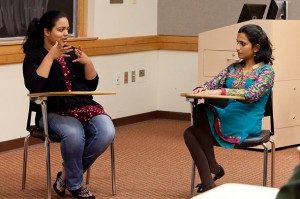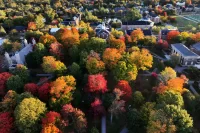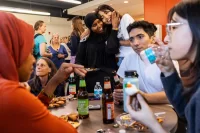Open to the World: Differences do transform, students of faith agree
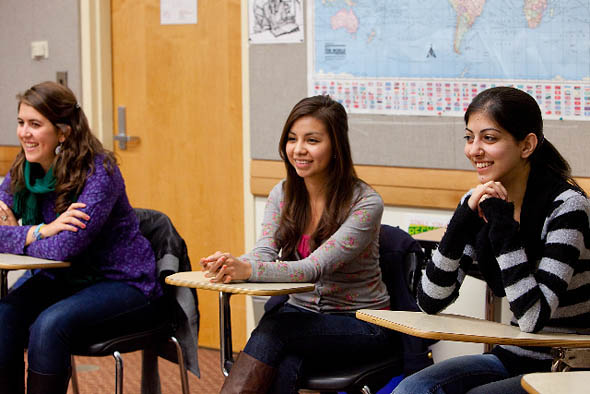
Shown during the Oct. 24, 2011, student interfaith conversation are panelists Rose Levy-Rubinett ’12, Cristal Martin ’13 and Amna Ilyas ’13. Photograph by Rene Minnis.
In Austin, Texas, Rose Levy-Rubinett ’12 grew up in a household where family history and Judaism were fused into a culture shared and unquestioned, more or less, by everyone.
But at Bates, “I’ve had to define for myself what it means being Jewish,” she said.
If the rigorous Bates education demands that assumptions be challenged and differences explored, the breadth of faiths here affords plenty of assumptions and differences to work on. That gives students like Levy-Rubinett a means to forge whole new perspectives on their beliefs and others’.
She and six other students discussed those expanded perspectives in an interfaith conversation Monday afternoon, Oct. 24, the first day of the weeklong Open to the World: Bates Celebrates Unbounded Learning programming.
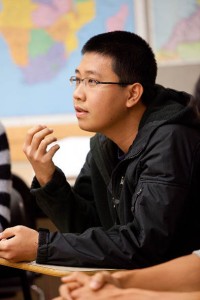
Aung Myint ’13 was a participant in the Oct. 24, 2011, student interfaith conversation. Photograph by Rene Minnis.
And if you ever wondered what the college’s mission statement means when it says “we engage the transformative power of our differences,” the discussion was a perfect demonstration.
Exploring the differences among faiths, the students agreed, was key to clarifying their own beliefs. This examination hasn’t shaken her faith, said junior Cristal Martin, a Christian from Wichita Falls, Texas, but it has “caused me to look deeper into what I what I believe.”
The Rev. Bill Blaine-Wallace, multifaith chaplain, welcomed about 30 students, staff and faculty to a Pettengill Hall classroom for the encounter. In lieu of a typical panel discussion (which can resemble doubles tennis but with all four players on the same side of the net), the interfaith conversation took a “reflecting team” format, designed to produce a more searching and meaningful dialogue.
The discussion began with Shachi Phene of Lexington, Mass., interviewing Shlesma Chhetri of Kathmandu, Nepal. Both are seniors and both Hindu, but from cultures half a world apart. They discussed the role of stories in their faith; dating outside the faith; and the awkwardness — the “double thinking,” in Chhetri’s words — of bringing one’s newly expanding conscious back to the old homestead.
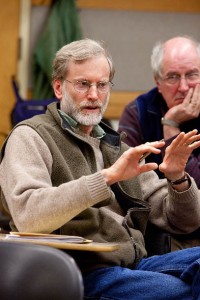
Phillips Professor of Religious Studies Tom Tracy makes a point during the Oct. 24, 2011, student interfaith conversation as Charles A. Dana Professor of Religious Studies John Strong listens on. Photograph by Rene Minnis.
Then the other participants reflected and expanded on these themes. Along with Martin and Levy-Rubinett, they were Aung Myint ’13, a Buddhist from Yangon, Myanmar; Brett Emmons ’15, a Baha’i from Dover, Del.; and Amna Ilyas of Faisalabad, Pakistan, a Muslim.
If the transformative power of difference was a leading cause for agreement, the participants also expressed the comfort they’ve found in discovering fundamental similarities among beliefs and among people, regardless of belief.
In every religion, there will be those convinced that only the true believers — that is, themselves — will find salvation. But, said Ilyas, “meeting people [of diverse faiths] who are such great human beings, how can that ever be true?”
She said, “I don’t think God will judge people on whether they are good Muslims or good Jews — just on whether they are good people.”
“Just sitting here conversing with open receptive hearts,” Emmons added, “it’s something the world could use more of.”
